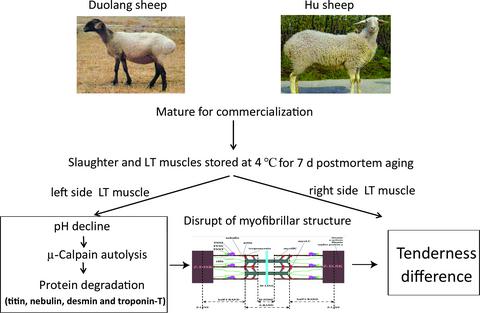当前位置:
X-MOL 学术
›
Int. J. Food Sci. Tech.
›
论文详情
Our official English website, www.x-mol.net, welcomes your
feedback! (Note: you will need to create a separate account there.)
The postmortem μ‐calpain activity, protein degradation and tenderness of sheep meat from Duolang and Hu breeds
International Journal of Food Science & Technology ( IF 2.6 ) Pub Date : 2017-12-22 , DOI: 10.1111/ijfs.13661 Xianglin Yan 1 , Rui Liu 1 , Chaoyang Zhang 1 , Xiaopu Ren 1, 2 , Wangang Zhang 1 , Guanghong Zhou 1
International Journal of Food Science & Technology ( IF 2.6 ) Pub Date : 2017-12-22 , DOI: 10.1111/ijfs.13661 Xianglin Yan 1 , Rui Liu 1 , Chaoyang Zhang 1 , Xiaopu Ren 1, 2 , Wangang Zhang 1 , Guanghong Zhou 1
Affiliation

|
This study aimed to investigate the differences in meat tenderisation between two Chinese native sheep breeds, Duolang and Hu. The tenderness of longissimus thoracis (LT) muscle, μ‐calpain autolysis and proteolysis of myofibrillar protein was measured at 1‐ and 7‐days postmortem storage at 4 °C. At 7‐days postmortem ageing, meat from Duolang sheep was more tender compared to that from Hu sheep. The Warner–Bratzler shear force of Duolang and Hu sheep was reduced by 55.20% and 41.51% at 7 days compared with 1 day, respectively. In Duolang LT, a higher proportion of 80‐kDa μ‐calpain was autolyzed than in the Hu samples at 1‐day postmortem ageing, but they did not differ significantly at 7 days. More titin, desmin and troponin‐T were degraded in Duolang sheep compared to Hu sheep. Additionally, pH values at the different ageing time were not significantly different, indicating that pH may be not a determinant factor contributing to the tenderness difference between the two breeds. Our data suggest the earlier activation of μ‐calpain and a larger extent of proteolysis of key structural proteins may contribute to the higher rate of tenderisation of Duolang compared to Hu sheep during postmortem ageing.
更新日期:2017-12-22













































 京公网安备 11010802027423号
京公网安备 11010802027423号